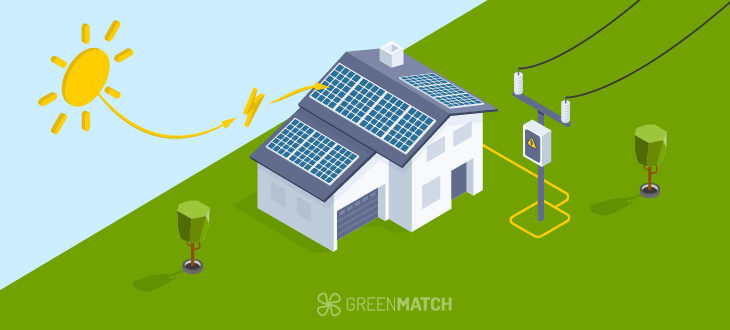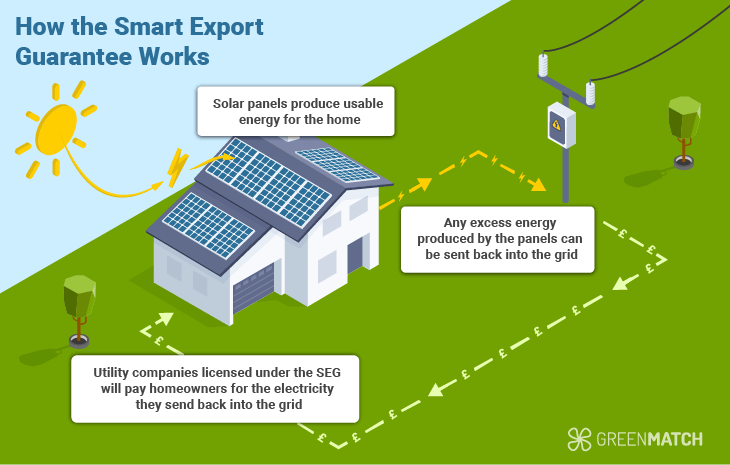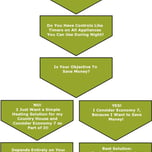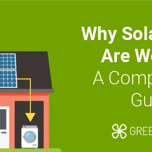Answer these simple questions and we will find you the BEST prices
Which type of solar quotes do you need?
It only takes 30 seconds
100% free with no obligation

Get up to 4 quotes by filling in only 1 quick form

Slash your energy bills by installing solar panels

For the average 2-3 bedroom house
- GreenMatch
- Blog
- Net Metering in the UK
Unveiling the Future of Metering in the UK


Across the UK, homeowners and businesses have been enjoying the benefits of solar power for well over a decade. Whilst many turn to solar panels to reduce their carbon footprint and switch to clean, renewable energy, there are other benefits to be had that can often get overlooked.
Through a ‘net metering’ system, solar panel owners can be rewarded for the excess energy their solar systems produce, which is sent back into the grid. Net metering is more commonly used in countries such as the US; however, policies in the UK offer similar benefits.
In this article, we’ll look at net metering, why it’s a valuable tool for solar panel owners and how to determine if you’re eligible for the UK’s best alternative.
What is net metering?
As solar panels absorb sunlight and convert it into usable electricity for the home, instances will occur when you have more available electricity than you can use. When this happens, you can return that excess energy to the national grid.
It’s at this point that net metering comes into play. Also known as ‘Net Energy Metering’ or ‘NEM’, this process slightly differs depending on your country.
For example, in the US, net metering is a form of billing process across some states. Once a home has produced enough solar electricity, the excess is sent to the grid. In return, homeowners are issued credits against their energy use balance. These credits can be used later if the homeowners need to access grid energy.
In a ‘net-metered’ US home, these credits might be activated when solar energy isn’t generated, such as at night. This way, utility companies will only bill them for their ‘net’ energy use.
It’s a rather clever system because solar panel owners still benefit from the renewable energy savings their panels provide them without the upfront costs.
You may view this process as a lot like having a solar storage battery, except that this battery is the national grid!
In the UK, however, we have a slightly different way of using a net metering structure.
For homeowners who produce their solar power, government policies allow you to effectively ‘sell’ any excess energy you produce to the grid in exchange for payment. To date, the Government have run two significant policies.

Solar net metering in the UK
The first known policy ran until 2019 and was the Feed-in Tariff. This was the first government-backed scheme to incentivise people to switch to renewable energy technology. Under this scheme, utility companies would pay a fixed rate for electricity exported to the grid guaranteeing these payments for up to 20 years.
This scheme was eventually closed to new applicants. However, it was soon replaced with the Smart Export Guarantee (SEG). This scheme is also a form of net metering, which can earn solar panel owners a rate per unit of electricity they send to the grid.
The SEG can greatly benefit solar energy generators, with expected annual earnings of between £80 - £170. Combined with the savings solar panels generate, this additional income can speed up the return on your solar installation investment.
To choose the best solar export tariff in the UK, we highly recommend consulting with a specialist to get your circumstances properly assessed.
Environmental benefits of net metering
Net metering in the UK benefits those who receive direct payments and has significant environmental benefits. By incentivising more people to switch to renewable technologies, such as solar and wind, net metering empowers homes and businesses to actively reduce carbon emissions and mitigate the impacts of climate change.
Several other benefits can be seen as an impact of these schemes:
- Reduced Greenhouse Gas Emissions: Solar panels and wind turbines generate electricity without burning fossil fuels, significantly reducing greenhouse gas emissions. As households and businesses generate electricity, the demand for energy from traditional fossil fuel power plants decreases.
- Clean Energy in the Grid: As more individuals join the scheme, more clean, renewable energy will be sent into the grid. This means an increase in renewable energy entering the country's supply mix.
- Energy Independence and Security: Net metering participants reduce their dependence on centralised energy sources by generating electricity. This decentralisation of energy production enhances energy security and resilience against power outages and supply disruptions. Moreover, this reduces the reliance on imported fossil fuels, enhancing the country's energy independence.
- Preservation of Natural Resources: Adopting net metering and renewable energy technologies lessens the demand for finite fossil fuel resources, such as coal, oil, and natural gas. As a result, there is less pressure to extract and exploit these non-renewable resources, which can have adverse environmental impacts, such as habitat destruction, water pollution and air pollution.
- Decreased Air and Water Pollution: Traditional fossil fuel-based electricity generation is a significant source of air and water pollution. Adopting net metering and the corresponding increase in renewable energy use will help reduce harmful pollutants. This improves air and water quality, benefiting human health and the environment.
Who can access the Smart Export Guarantee?
The UK’s net-metering policy is not only for solar panel owners. It can also benefit anyone producing renewable energy, which can be sent to the grid. The following technologies apply:
- Solar photovoltaic (Solar PV)
- Wind
- Hydro (Water)
- Micro combined heat and power (micro-CHP) - a boiler-sized unit that can be used in homes, generating electricity while heating water simultaneously.
- Anaerobic digestion (AD) is a process in which bacteria break down organic matter, such as food waste, to produce biogas or fertiliser.
There are some requirements, however, that must be met to access the SEG. The technology you use must be installed in Great Britain and have a total installed capacity (TIC) of no more than 5 Megawatts (MW) or 50 kilowatts (KW) for a micro-CHP.
Solar panel net metering requirements
Before you apply for the Smart Export Guarantee, there are two critical points that you should check first.
Certification
Solar PV applicants may be asked to demonstrate that their installation is correctly certified. You may have been given a certificate from your installer which shows this, such as an MCS certificate (Microgeneration Certification Scheme) or an equivalent.
This is to show that the installer who fitted your solar technology is accredited per regulatory standards. If you’re unsure about this certification, you can speak with your chosen SEG licensee (any utility company signed up for the scheme) to understand what information they require from you for the application to proceed.
Metering
The second important element is to ensure the energy you send to the grid can be accurately measured. To do this, you must install a suitable meter that can take readings every half-hour.
This meter must also have a reference number, known as an ‘MPAN’. This unique 13-digit number is used to identify electricity points in the country. You may already have an MPAN for imported electricity, but a different one is needed for exports. If you don’t have an export MPAN, your SEG licensee can provide one.
Your existing meter may be capable of measuring your exported electricity, but if not, you may need to install a smart meter instead. You must check with your licensee whether your existing set-up is suitable, as they may even be able to help with the cost of installing a new one.
How to apply for solar metering
You will need to take several steps to take advantage of the Smart Export Guarantee in the UK.
1. First, you need to research and choose an SEG licensee. These are the utility companies that will pay for your energy exports. Each licensee can offer different payment tariffs per unit of energy, so it’s essential to look around and pick the one that suits you best.
Here is a list of the current SEG licenses. You should consult the official Ofgem list to check the latest, most up-to-date information.
| Mandatory Licensees | Voluntary Licensees |
|---|---|
| British Gas E (Gas & Electricity) E.ON EDF Octopus Energy OVO Energy Scottish Power Shell Energy So Energy The Utility Warehouse Utilita | Positive Energy Rebel Energy |
2. Once you know your supplier, apply through them directly. They should have all relevant application details on their website.
3. The licensee can then confirm if your application is accepted, your tariff and contract length, and any other details specific to your technology.
You can apply to any SEG licensee; you do not need to use the same utility company that supplies your energy, for example.
For further details on the application process, visit Ofgem’s official guidance page.
Conclusions
For homeowners in the UK, net metering can offer significant benefits that make it an attractive incentive to invest in renewable energy.
Solar panel owners, for example, can receive set payments by exporting surplus electricity to the grid. These payments can help offset the high costs of their solar panel installation and contribute to lowering the cost of other utility bills.
The Smart Export Guarantee (SEG) is the primary net metering scheme available in the UK, and it can help add increased value to many renewable energy installations. As more homeowners and businesses are rewarded for producing renewable energy, more people may be incentivised to adopt the technology. As more people contribute their renewable energy to the grid, our overall energy supply becomes cleaner and greener.
By creating a system that compensates energy producers for their contributions to the grid, the UK is creating a more inclusive and decentralised energy model, empowering people to engage in the fight against climate change actively.
While net metering might work slightly differently here than in other countries, the benefits for individuals and the environment are significant. Schemes like the SEG pave the way for a more sustainable future by giving us alternatives to fossil fuel-based energy.
Net metering is not only an excellent deal for environmentally conscious homeowners, but the rewards are also contributing to the overall well-being of the planet.

Becky is an experienced SEO content writer specialising in sustainability and renewable trends. Her background in broadcast journalism inspires reliable content to help readers live more sustainably every day.
We strive to connect our customers with the right product and supplier. Would you like to be part of GreenMatch?




